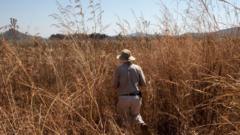In a significant development, Zimbabwe has announced its first compensation payment of $3 million to white farmers whose properties were taken under a government initiative aimed at addressing historic land injustices. This marks the initial disbursement under a 2020 agreement, in which Zimbabwe pledged $3.5 billion to compensate ex-farmers for the 2000-2001 land seizures, which were instrumental in the country’s economic decline and damaged relations with the West.
Zimbabwe Initiates Compensation Payments to White Farmers Post-Land Seizures

Zimbabwe Initiates Compensation Payments to White Farmers Post-Land Seizures
Zimbabwe's government begins first compensation payments for land seized over 20 years ago.
Zimbabwe's Finance Minister, Mthuli Ncube, confirmed the initial payment will cover 378 farms out of a total of 740 eligible for compensation, constituting only 1% of the initially designated $311 million for these payments. The government plans to issue Treasury bonds for the remaining funds, stating that this move is crucial in its efforts to stabilize the nation’s economy and improve international relations.
The controversial land reform policy aimed to redistribute land from the white minority to black farmers but caused significant turmoil, leaving many farms in disarray and affecting the nation’s output. Following these historical land grabs, the government has faced criticism for not compensating former owners for the land itself, focusing instead on the improvements made on the properties.
While some farmers have expressed interest in the compensation process, many former owners reportedly prefer to hold onto their title deeds. Under President Emmerson Mnangagwa’s administration, efforts are being made to mend ties with Western nations, further complicated by Zimbabwe's long-term exclusion from the global financial system.
Analysts highlight that these initial payments could signal a turning point in Zimbabwe's international relations and a step towards economic recovery.
As Zimbabwe moves forward, the success of this compensation initiative will be closely watched by both domestic and international observers, marking the beginning of a potentially transformative chapter in the country’s ongoing journey from its turbulent past.
The controversial land reform policy aimed to redistribute land from the white minority to black farmers but caused significant turmoil, leaving many farms in disarray and affecting the nation’s output. Following these historical land grabs, the government has faced criticism for not compensating former owners for the land itself, focusing instead on the improvements made on the properties.
While some farmers have expressed interest in the compensation process, many former owners reportedly prefer to hold onto their title deeds. Under President Emmerson Mnangagwa’s administration, efforts are being made to mend ties with Western nations, further complicated by Zimbabwe's long-term exclusion from the global financial system.
Analysts highlight that these initial payments could signal a turning point in Zimbabwe's international relations and a step towards economic recovery.
As Zimbabwe moves forward, the success of this compensation initiative will be closely watched by both domestic and international observers, marking the beginning of a potentially transformative chapter in the country’s ongoing journey from its turbulent past.




















